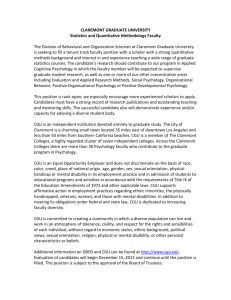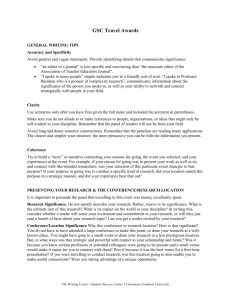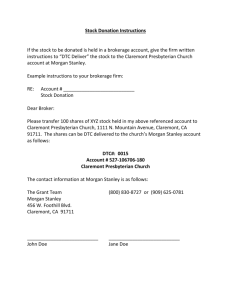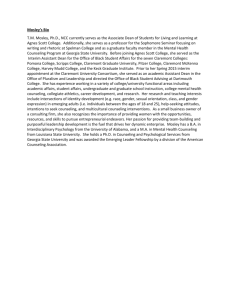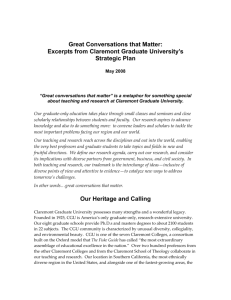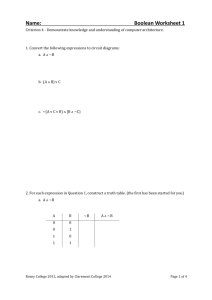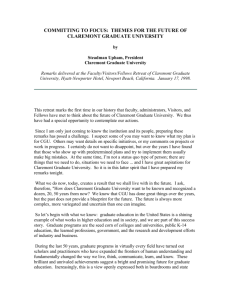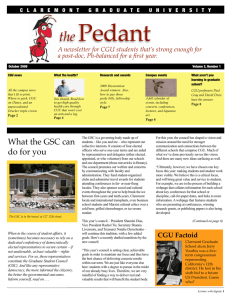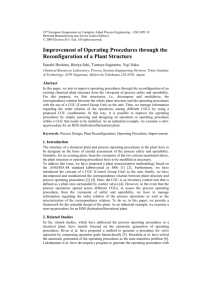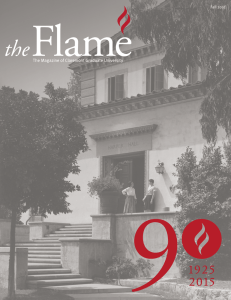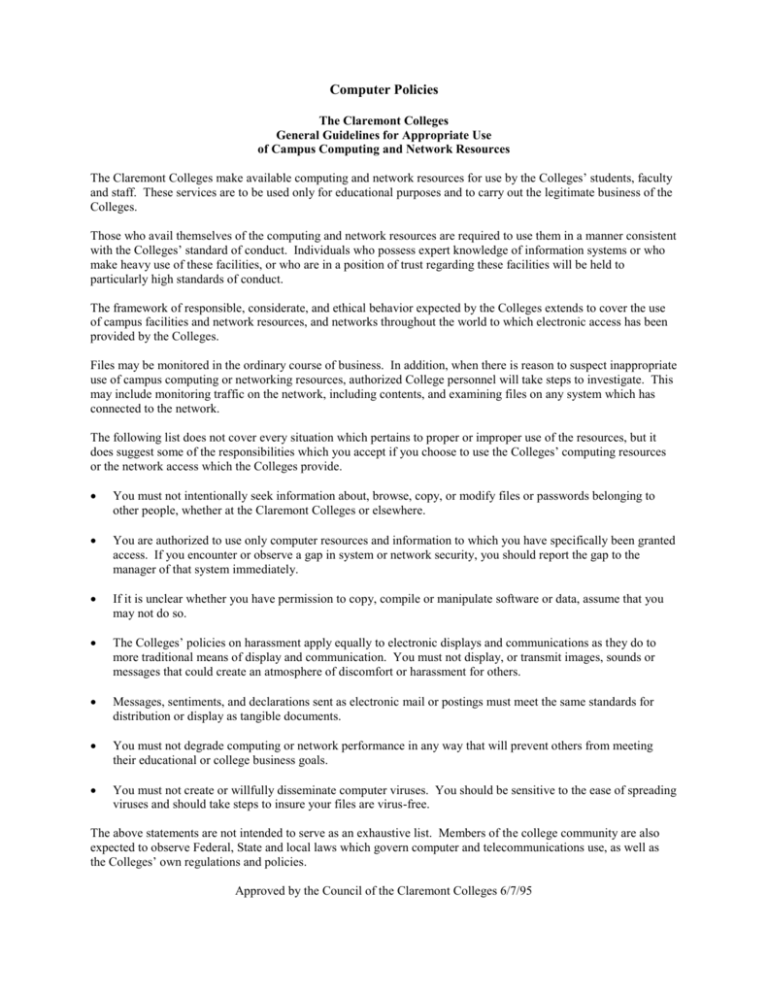
Computer Policies
The Claremont Colleges
General Guidelines for Appropriate Use
of Campus Computing and Network Resources
The Claremont Colleges make available computing and network resources for use by the Colleges’ students, faculty
and staff. These services are to be used only for educational purposes and to carry out the legitimate business of the
Colleges.
Those who avail themselves of the computing and network resources are required to use them in a manner consistent
with the Colleges’ standard of conduct. Individuals who possess expert knowledge of information systems or who
make heavy use of these facilities, or who are in a position of trust regarding these facilities will be held to
particularly high standards of conduct.
The framework of responsible, considerate, and ethical behavior expected by the Colleges extends to cover the use
of campus facilities and network resources, and networks throughout the world to which electronic access has been
provided by the Colleges.
Files may be monitored in the ordinary course of business. In addition, when there is reason to suspect inappropriate
use of campus computing or networking resources, authorized College personnel will take steps to investigate. This
may include monitoring traffic on the network, including contents, and examining files on any system which has
connected to the network.
The following list does not cover every situation which pertains to proper or improper use of the resources, but it
does suggest some of the responsibilities which you accept if you choose to use the Colleges’ computing resources
or the network access which the Colleges provide.
You must not intentionally seek information about, browse, copy, or modify files or passwords belonging to
other people, whether at the Claremont Colleges or elsewhere.
You are authorized to use only computer resources and information to which you have specifically been granted
access. If you encounter or observe a gap in system or network security, you should report the gap to the
manager of that system immediately.
If it is unclear whether you have permission to copy, compile or manipulate software or data, assume that you
may not do so.
The Colleges’ policies on harassment apply equally to electronic displays and communications as they do to
more traditional means of display and communication. You must not display, or transmit images, sounds or
messages that could create an atmosphere of discomfort or harassment for others.
Messages, sentiments, and declarations sent as electronic mail or postings must meet the same standards for
distribution or display as tangible documents.
You must not degrade computing or network performance in any way that will prevent others from meeting
their educational or college business goals.
You must not create or willfully disseminate computer viruses. You should be sensitive to the ease of spreading
viruses and should take steps to insure your files are virus-free.
The above statements are not intended to serve as an exhaustive list. Members of the college community are also
expected to observe Federal, State and local laws which govern computer and telecommunications use, as well as
the Colleges’ own regulations and policies.
Approved by the Council of the Claremont Colleges 6/7/95
Computer Policies
CGU Administrative Computing Policies
Access
Claremont Graduate University is the owner of all administrative computing systems and the data
contained within. This includes the personal computers located in employee offices as well as the
network servers such as the administrative VAX, email post office, or Windows NT servers. An
employee’s access to these systems and data is defined and limited by the department granting access.
The requirements of the employee’s job will determine how much access that person is given. By
accepting access to the administrative computer systems of Claremont Graduate University, employees
acknowledge acceptance of the responsibilities defined in both the General Guidelines for Appropriate
Use of Campus Computing and Network Resources and the CGU Administrative Computing Policies.
Monitoring
As owner of all administrative computing systems and data contained within, Claremont Graduate
University reserves the right to monitor the use of all computing systems to maintain security.
Confidentiality
All data residing on administrative computers is for official business of Claremont Graduate University,
and as such, should only be released during the course of official business. Records of faculty, students,
staff, or donors of Claremont Graduate University are confidential. Employees may not disclose any of
this information to any party except as part of the official business of the University.
Accounts and Passwords
Access to data on administrative computer systems is limited through the use of user accounts and
passwords. When a user is given an account, it is their responsibility to keep their password secret. Users
should observe the following "established password practices:"
NEVER give your username and password to another person.
Do not leave your terminal or PC logged on and unattended.
NEVER write down your username and password.
Change passwords frequently.
Make passwords unique and difficult to guess.
Software
All software running on administrative computing systems must be licensed by Claremont Graduate
University. CGU employees should not install any software on any administrative computers without
prior approval of Administrative Computing. In addition, employees may not commit unauthorized
copying of software or data. (Certain licenses of certain software packages may allow the user to have a
copy at work and at home. Check with Administrative Computing to find out which software this applies
to.)
Backup
Although Claremont Graduate University is the owner of all data residing on administrative computing
systems, CGU employees share some of the responsibility for backing up that data. Backup of data
residing on servers is the responsibility of Administrative Computing and is accomplished by
Administrative Computing personnel. This includes the administrative VAX, the Millennium server, the
Microsoft Mail Post office, the PowerFaids server and the SPARC servers. Backup of data residing on
individual PCs in CGU offices is the responsibility of the individual employee who uses that PC.
Computing Policies
Claremont Graduate University Academic Computing Policies
Responsibility for Files: While Academic Computing at CGU will make every effort to provide reliable places to
store data being used for academic work, it takes no responsibility for maintaining or recovering any files of any
student, faculty, or staff member stored on any computer on the CGU campus. It is the responsibility of each
individual user to make backup copies of their own files. We urge everyone to do so. Academic Computing is
ready to assist in showing clients how to back up their data and to help in cases of data loss, but the ultimate
responsibility of data lies with the owner of that data.
Addition of Software to Computers: Clients should not install any software on any
computers on the CGU network without prior approval of Academic Computing. They should
not modify software on the computers in any way. Doing either of these things may result in the
loss of all computing privileges. A specific need to run a piece of software not currently on
CGU computers should be addressed to Academic Computing: we will do what we can to
accommodate the need.
Abuse of Network Privileges: Use of the CGU network or the Internet to do any kind of
damage to any computer on these networks or to threaten or harass any user on any computer or
for non-academic purposes will result in the temporary or permanent loss of all computing
privileges at CGU.
Games: No playing of computer games is allowed in any of the labs. This includes Internet
games such as MUDD and MUSH games. Playing of a game designed to produce network or
individual computer problems will result in immediate loss of computer privileges at CGU.
Accounts: No computing accounts should be used by anyone other than the owner. Provision
of an account name and password or other access to an account issued by CGU Academic
Computing to someone other than the owner is grounds for loss of all computing privileges.
CGU'S WORLD-WIDE WEB RELATED POLICIES
COPYRIGHT AND DISCLAIMER
Claremont Graduate University's Web site provides a wide range of information about the
University. While every effort is made to maintain complete, up-to-date, and accurate
information, the University reserves the right to change its programs, costs, and policies as
necessary.
The views and opinions expressed on personal pages are strictly those of the authors. Claremont
Graduate University does not edit or pre-approve personal pages and accepts no responsibility
for the contents therein.
All content on the www.cgu.edu server copyright © 2004 Claremont Graduate University. All
rights reserved.
CGU'S WORLDWIDE WEB POLICIES
What is the WWW Site Statement of Purpose of the CGU Web Site?
The purpose of the Web site is to foster the achievement of CGU's mission through enhancing
(a) teaching, (b) research, and (c) the administrative functions needed to support these objectives.
It should only be used for purposes directly related to the achievement of the institution's
objectives.
What is the Content of WWW?
WWW is an electronic "publication" of CGU and as such is subject to the same content
requirements of other publications. Only materials that will help achieve the purpose of the site
are allowed to be published.
The CGU Web site consists of four distinct, but related, parts:
Institutional pages are edited and maintained by individual departments. They include but are
not limited to the home page, student affairs pages, policy pages, and pages which provide links
to the departments and schools.
Departmental and school pages are those pages that are linked from the institutional pages but
are maintained by designated departmental coordinators. The Web Communications Manager
supports these coordinators.
Personal pages may be posted on the CGU Web server by faculty with the understanding that
those pages provide information relevant to the individual's role at the University. Personal
Web pages are subject to the same policies applied to other Web pages and publications. Note
especially that pages on University servers may not be used to promote personal business or to
provide personal financial gain.
Personal pages shall not give the impression that they are representing, giving opinions, or
otherwise making statements on behalf of the University unless appropriately authorized
(explicitly or implicitly) to do so. Where appropriate, an explicit disclaimer shall be included
unless it is clear from the context that the author is not representing the University.
An appropriate disclaimer is:
The opinions or statements expressed herein should not be taken as a position or endorsement of
Claremont Graduate University.
All sites under University jurisdiction (i.e., on Claremont Graduate University servers) must
display information on the ownership of the sites, including a contact name with email address,
and the date of the last update. If the site consists of more than one page, the ownership
information should appear on all pages of the site.
Who is Responsible for the Web Site?
The responsibility for recommending policy and determining access to and use of the Web site is
vested in the Web Committee which reports to the IT Steering Committee.
COPYRIGHT INFRINGEMENT COMPLAINTS
In accord with the Digital Millennium Copyright Act (DMCA), allegations of copyright
infringement on Claremont Graduate University’s web site locations should be reported to our
designated agent:
Director of Information Technology
Claremont Graduate University
150 East Tenth Street
Claremont, CA 91711-6160
Phone: (909) 621-8077
Fax: (909) 607-9821

